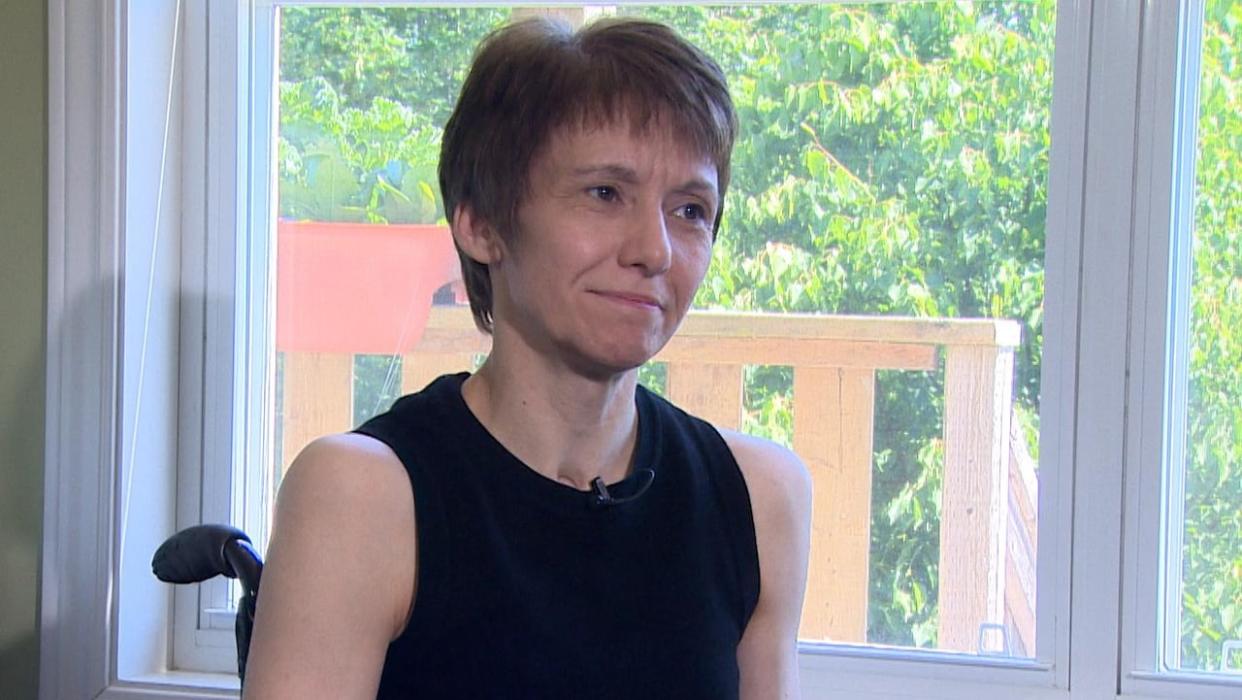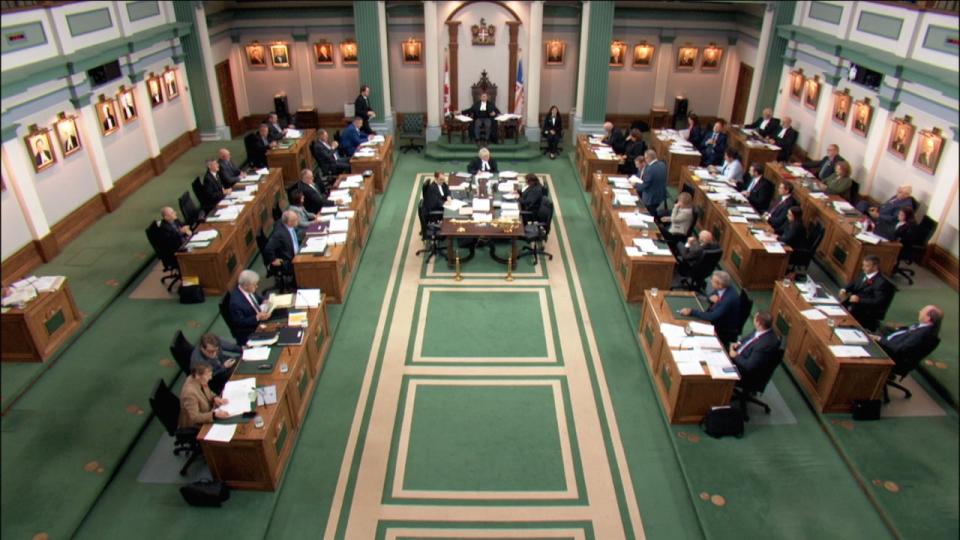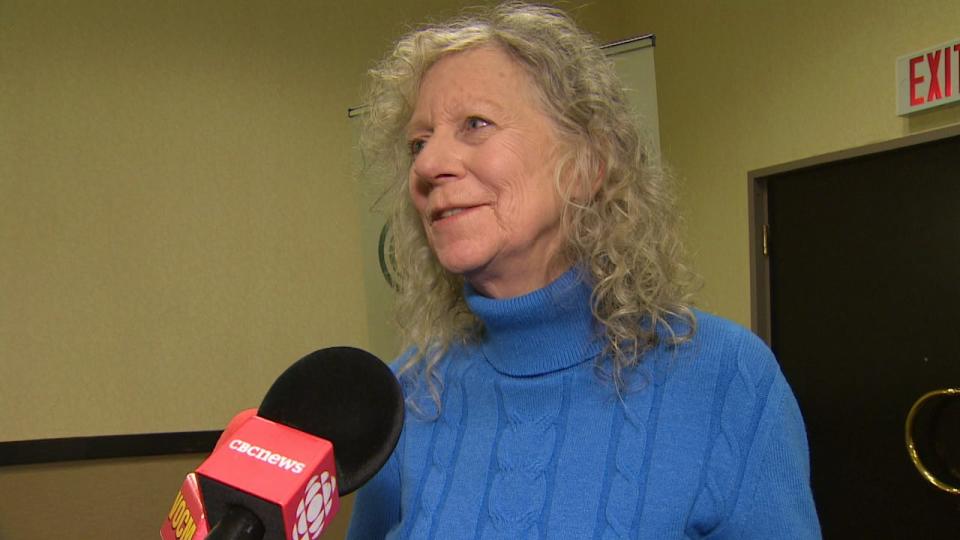Disabilities coalition refuses to join government's 'facade' of marking international day


Nancy Reid is the executive director of the Coalition of Persons with Disabilities Newfoundland and Labrador. The organization usually takes part in an event with the provincial government to mark the International Day for Persons with Disabilities on Dec. 3, but won't do that this year due to concerns over accessibility legislation. (Ted Dillon/CBC)
The Coalition of Persons with Disabilities in Newfoundland and Labrador says they will not continue their regular public appearance with the provincial government on the International Day for Persons with Disabilities this year, because of what it calls regressive actions over legislation.
Dec. 3 is the International Day for Persons with Disabilities, observed by the United Nations as a day to promote the rights and well-being of people with disabilities.
"This year I could just not in good conscience sit at the table with the minister responsible … [contributing] to an illusion of inclusion of persons with disabilities," said executive director Nancy Reid on Wednesday.
"I think that if we were to sit there, it would really contribute to some kind of facade that is just not real."
Reid usually spends the day at a government news conference, signing a proclamation to continue support for people with disabilities.
This year, the group is hosting its own event Thursday without government representation.
"The actions that we see of government as of late are really regressive, and certainly not in the broad way contributing to the success of persons with disabilities," she said.
Reid said the "straw that broke the camel's back" was amendments to the province's Buildings Accessibility Act. It received its third reading in the last legislative session and received the support of Paul Pike, the minister responsible for the status of persons with disabilities.
In particular, the amendment removes a building clause established in 1981, which says that any building built before that time didn't have to comply with accessibility standards.
While the amendment was initially perceived as positive, Reid said, it also clarified that those standards would only need to apply to renovations or additions to those buildings.
"If, for instance, a building was a four-storey building and the renovations … were on the fourth floor of that building, then the building would be expected to be compliant with the act only on the fourth floor," Reid said.
"The access to that [building] might never be accessible. We might still have a building with no elevator or no access."
Reid said the buildings accessibility advisory board, which the government established to shape the amendments, had its recommendations ignored.

Bill 52, an act to amend the Buildings Accessibility Act, received its third reading in the House of Assembly during the last legislative session. Reid asked the province and the lieutenant-governor to reconsider the amendment and to not give it royal assent, but the bill was passed Nov. 16. (Government of Newfoundland and Labrador)
In a statement, Housing Department spokesperson Tina Newhook said while the provincial government appreciates the coalition's concerns, recent amendments represent "the culmination of many years of hard work and consultation," and that the recommendations of the advisory board were taken into account.
"We recognize that our work is not done. We support the concept of continuous improvement and truly see this as an ever-evolving piece of legislation that will shift and change over time. We will continue to engage and listen to those persons with disabilities, accessibility advocates and the people of the province to build upon these recent amendments."
On Thursday, PC MHA Helen Conway-Ottenheimer said the coalition's decision to hold an event without government support shows that people aren't being listened to.
"They're not happy, they're not satisfied.… They're concerned with the lack of action by the government," Conway-Ottenheimer said.
"We need to make sure, No. 1, that people are properly consulted … especially people who have so much to say, who are really experts in this area."
Changing language
Reid is also concerned about plans to change the definition of a person with a disability in Newfoundland and Labrador.
Reid said the current definition includes sensory-related disabilities — like neurodiversities, communication disabilities and intellectual disabilities — but sensory-related disabilities are set to be cut from the definition.
"Many of those areas are just disregarded fully with this new definition of person with disability," she said.
"It's really backwards, it's outdated, and it's beyond our understanding how this could ever be considered to be appropriate."

Anne Malone is blind, and has been a longtime disability justice activist in Newfoundland and Labrador. She applauded the decision to coalition's decision to exclude the government from Thursday's event. (Chelsea Jacobs/CBC)
Anne Malone, a disability justice activist in St. John's, said she was "gobsmacked" by the amendments. She applauded the coalition for taking a stand.
"[To] redefine what constitutes a disability is a very slippery slope that could extend to other communities, you know, in a climate where queer identity is very much in the spotlight," Malone said.
"These things don't happen in silos.… That's something to be concerned about."
Reid said she hopes hosting an event without government support will show the province how serious the issue is.
She wrote a letter to Lt.-Gov. Joan Marie Aylward asking her not to give royal assent to the bill, but royal assent was given Nov. 16.
Download our free CBC News app to sign up for push alerts for CBC Newfoundland and Labrador. Click here to visit our landing page.


